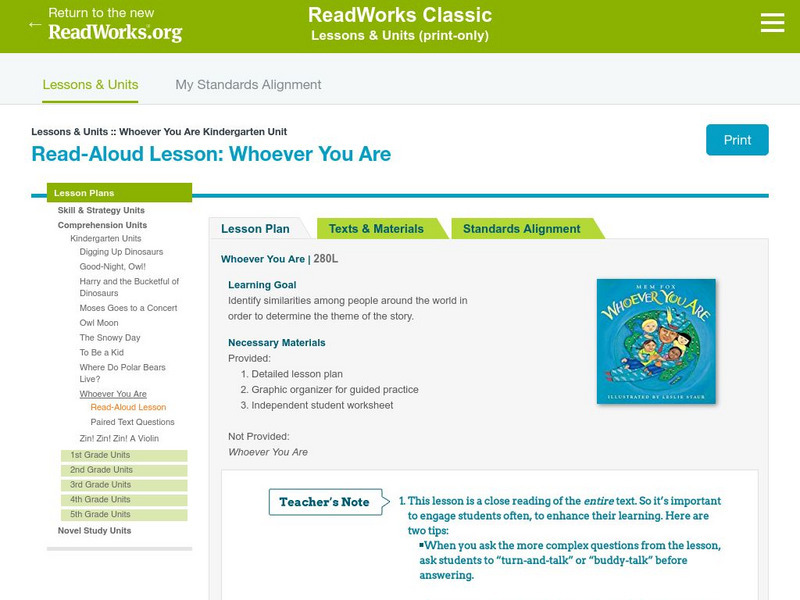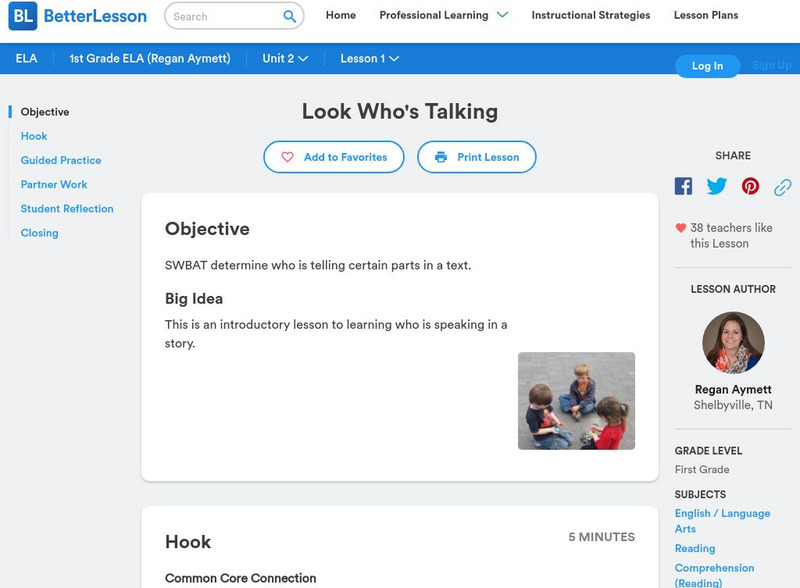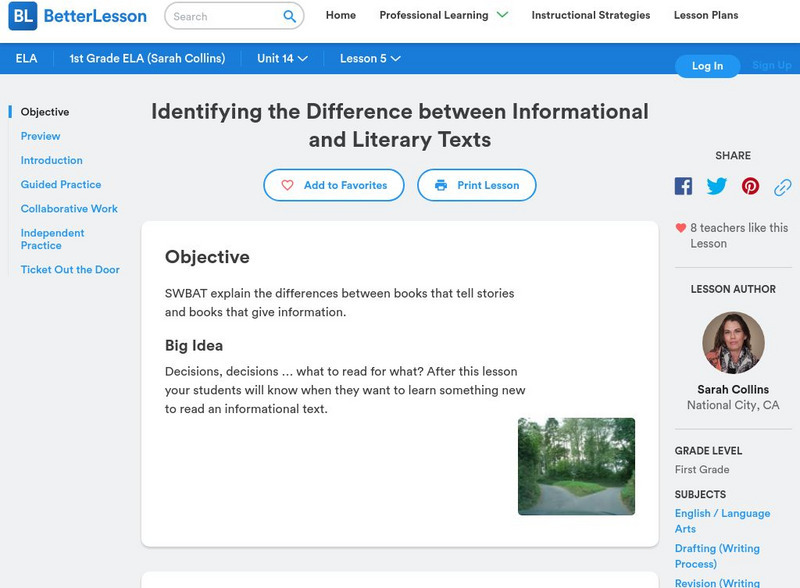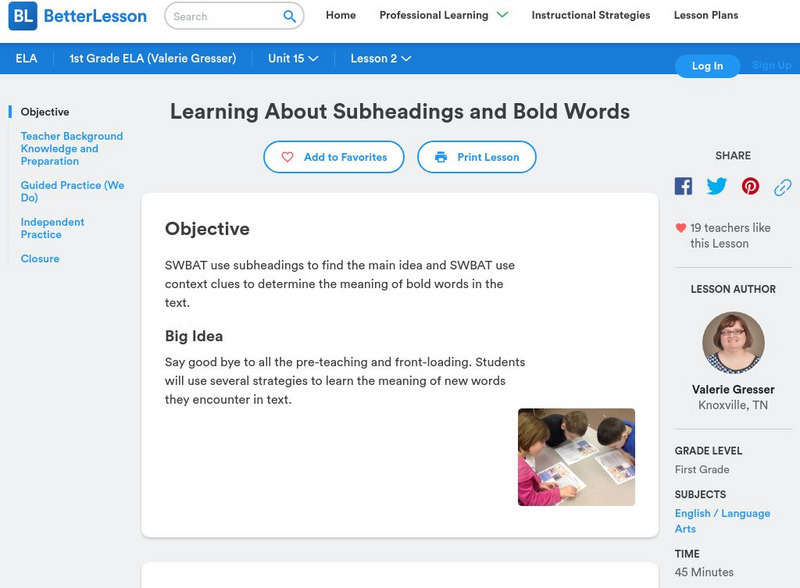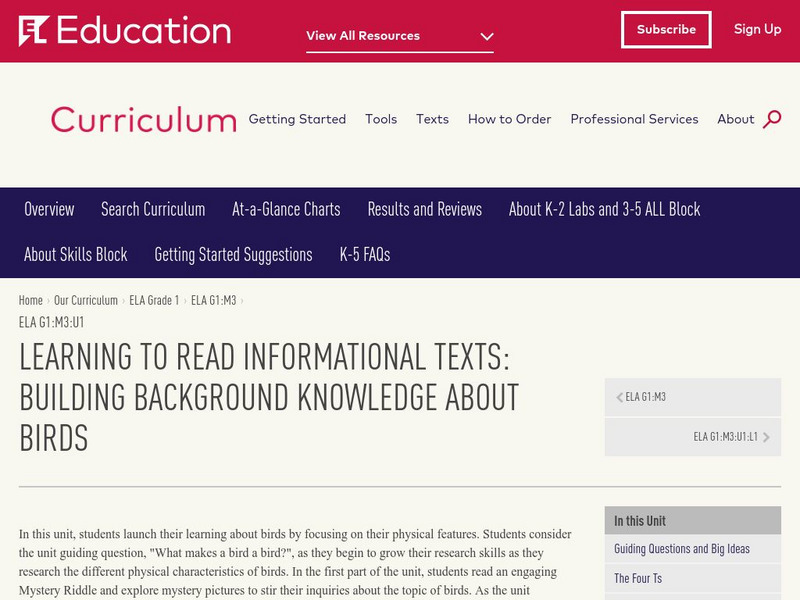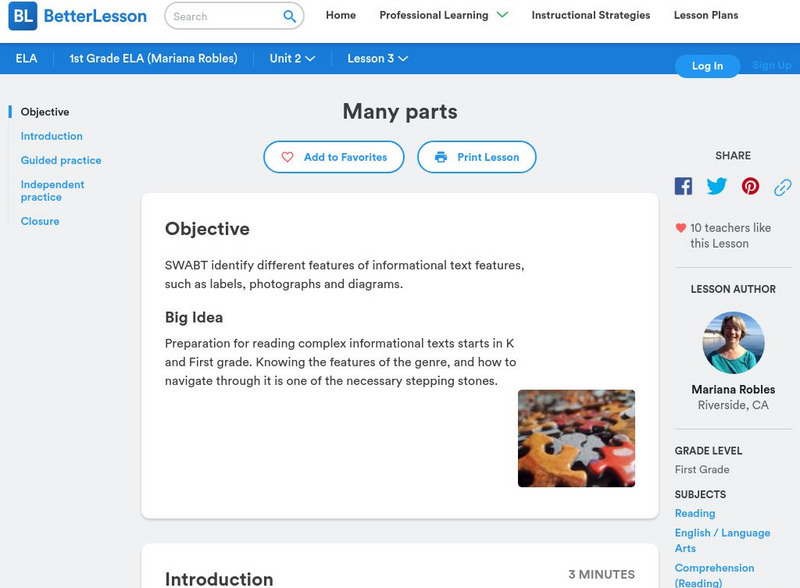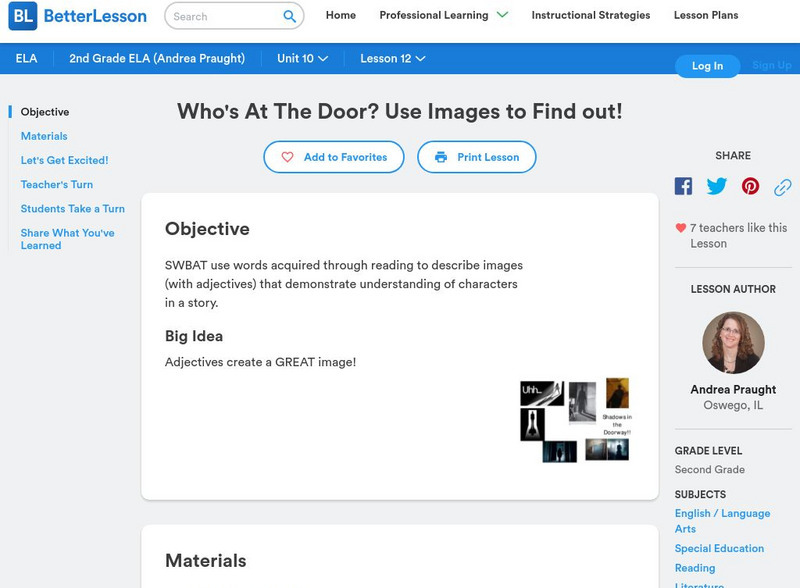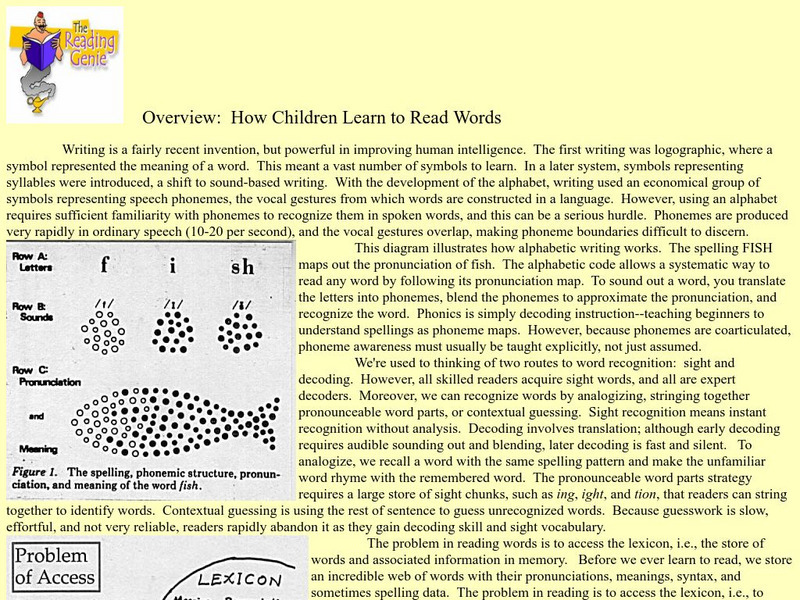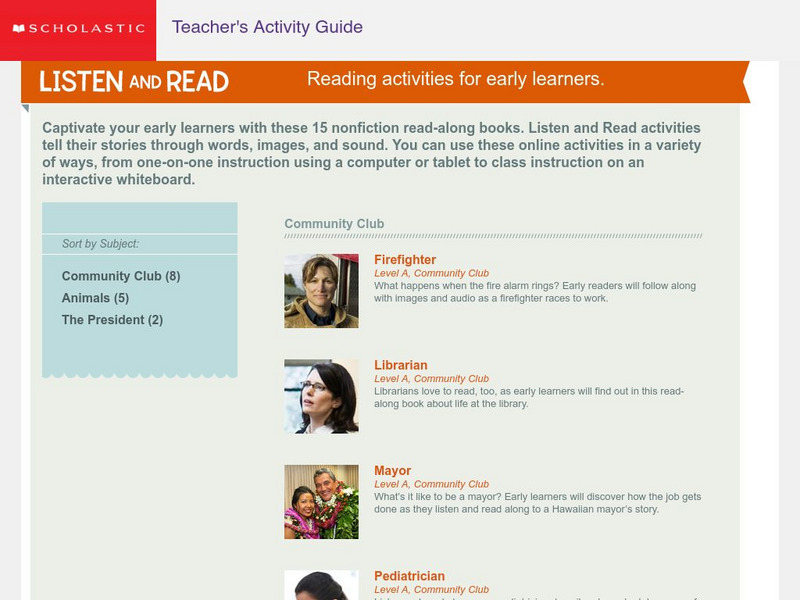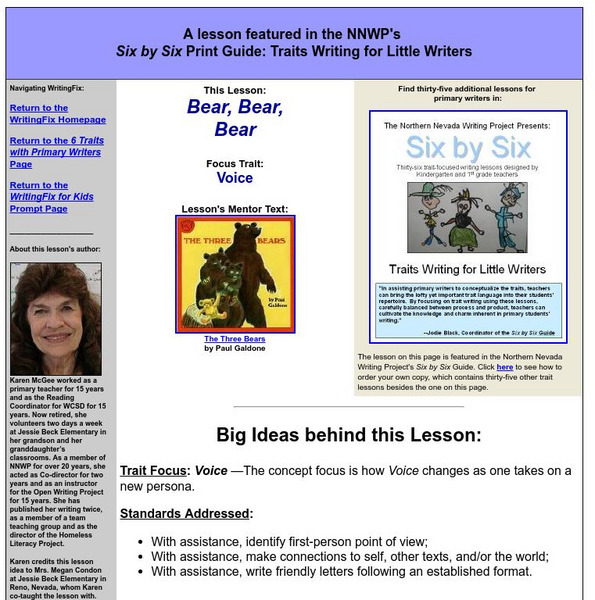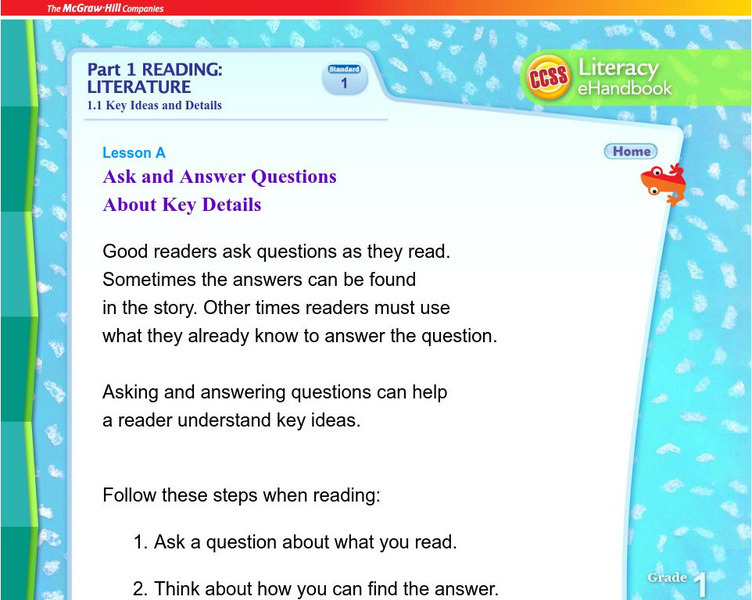Other
Grade 1 Informative Writing Lessons
Authored by the Tsehai Russell and Della Wright, CLR fellows, this resource provides a 5-day unit of informative writing lessons. Focus lessons related to facts and opinions and paragraph writing. This series is supported by the Academic...
Other
Corwin Press: Chapter 7: Informational Text Lessons in First Grade
This chapter provides guided informational text lessons for first graders. Differentiation and management tips are provided, along with steps to use while implementing these lessons.
Better Lesson
Better Lesson: Picture Walk and Partner Talk
Students will participate in a picture walk through the expository text "Seasons and Weather". The purpose of the picture walk is to prepare the students for reading the story and gives them practice in using picture clues to make...
Better Lesson
Better Lesson: Pictures and Text Work Together Too!
The class will read the informational text "Together They Were Better". As the teacher reads the book aloud, she/he will use the illustrations from each page to give students clues as to the text on the page, helping them to see the...
Read Works
Read Works: Read Aloud Lesson: Whoever You Are
In this read-aloud lesson, students will identify similarities among people around the world in order to determine the theme of the story. Included is a detailed lesson plan, graphic organizer for guided practice, and an independent...
Better Lesson
Better Lesson: Guess My Solid
Descriptive details are used as students develop a guessing game poster for others to try and guess their chosen solid. Included in this detailed lesson plan are videos, samples of student work, a printable worksheet, an assessment...
Better Lesson
Better Lesson: Say What?
This is a practice lesson designed to excite sports fans in a unit about determining who is speaking in a story. The students practice this specific skill as the teacher models it in the hook. They get guided practice sorting and...
Better Lesson
Better Lesson: Who Said That?
It is important for learners to learn how to identify who is telling the story. This lesson not only asks students to identify the speaker but also asks the learners to start identifying the point of view in the guided practice and...
Better Lesson
Better Lesson: Look Who's Talking
This is an introductory lesson to learning who is speaking in a story. The students do this specific skill after the teacher models it in the hook. They get guided practice sorting and labeling who is talking in the guided practice and...
Better Lesson
Better Lesson: Identifying the Difference Between Informational and Literary Text
Young scholars will learn the difference between books that tell stories and books that give information. Multiple videos of different level reading groups engaged in this lesson, along with a printable activity sheet are included.
Better Lesson
Better Lesson: Learning About Subheadings and Bold Words
In this lesson plan, students will use several strategies to learn the meaning of new words they encounter in text. The students will learn specific strategies so when they encounter new words, they can figure out the meaning of those...
EL Education
El Education: Learning to Read Informational Texts: Building Background
In this comprehensive unit, students launch their learning about birds by using informational texts. As students read these texts, they build background knowledge and develop their skills as readers of informational texts. Included are...
Better Lesson
Better Lesson: Many Parts
Preparation for reading complex informational texts starts in K and First grade. Knowing the features of the genre, and how to navigate through it is one of the necessary stepping stones. This instructional activity introduces the...
Better Lesson
Better Lesson: Who's at the Door? Use Images to Find Out!
Students will use words acquired through reading to describe images (with adjectives) that demonstrate an understanding of characters in a story. The teacher will read Miss Nelson is Back which has great descriptors and will hold a class...
Reading Rockets
Reading Rockets: Looking at Writing: First Grade
First graders write many times a day to express their interests - they are writing with a purpose through stories, letters, and lists. In this section, you'll find writing assessment resources, writing strategies, and additional tip...
Auburn University
Auburn University: How Children Learn to Read Words
How do children really learn to read words? This resource offers insight into this complicated but exciting journey of putting sounds and words together to learn the joy of reading. Come and discover more.
Michigan State University
Michigan State University: Interventions for Reading: Reconciled Reading
This intervention, which is based on Schema Theory, engages students in enrichment activities prior to reading the passage. For this way, students have the opportunity to activate and enhance existing knowledge before reading....
Reading Rockets
Reading Rockets: Teacher Toolbox Decoding
What are the guidelines for decoding instruction? Explore this website from Readingrockets.org to find out the answer to this question.
Scholastic
Scholastic: Listen and Read
Choose to read and/or listen to 15 different books on members of the community, animals, and the President. Review vocabulary at the end of each book.
Writing Fix
Writing Fix: Bear, Bear, Bear
After reading The Three Bears by Paul Galdone, students look at letters written from the point of view of each of the bears to learn how word choice effects voice. Then students practice writing in different voices.
Free Reading
Free Reading: Sentence Scramblers
A great exercise to help learners practice reading fluency by using sentence strips and games.
Free Reading
Free Reading: Reading Connected Text Activities
Great lesson plans and stories to build reading fluency and accuracy. Choose from beginner readers to 80 word passages.
Curated OER
Mc Graw Hill: Part 1: Reading Literature
Learn how asking and answering questions can help readers understand literature better. Site includes a model and an example of how to use this system.
Curated OER
Mc Graw Hill: Part 1: Reading Literature: 1st Grade Retell Stories
Learn how to use retelling a story to increase student's comprehension of a story.

